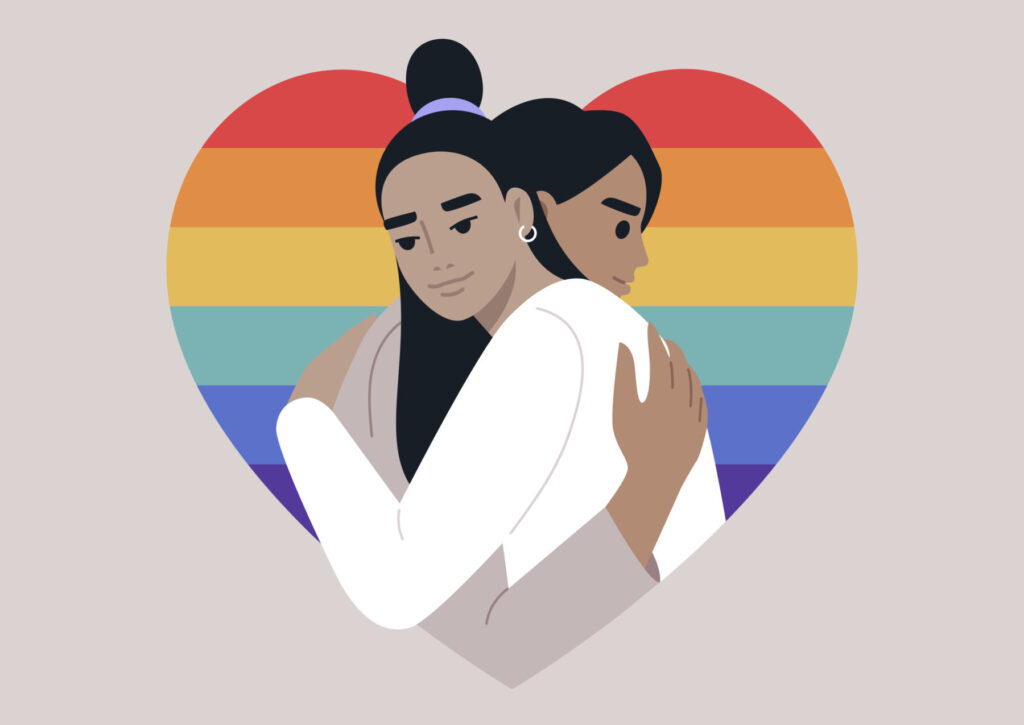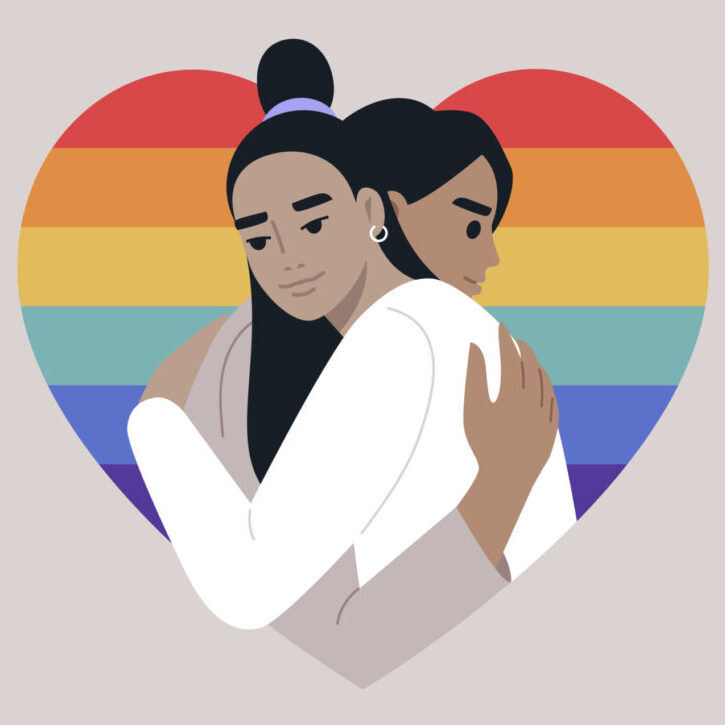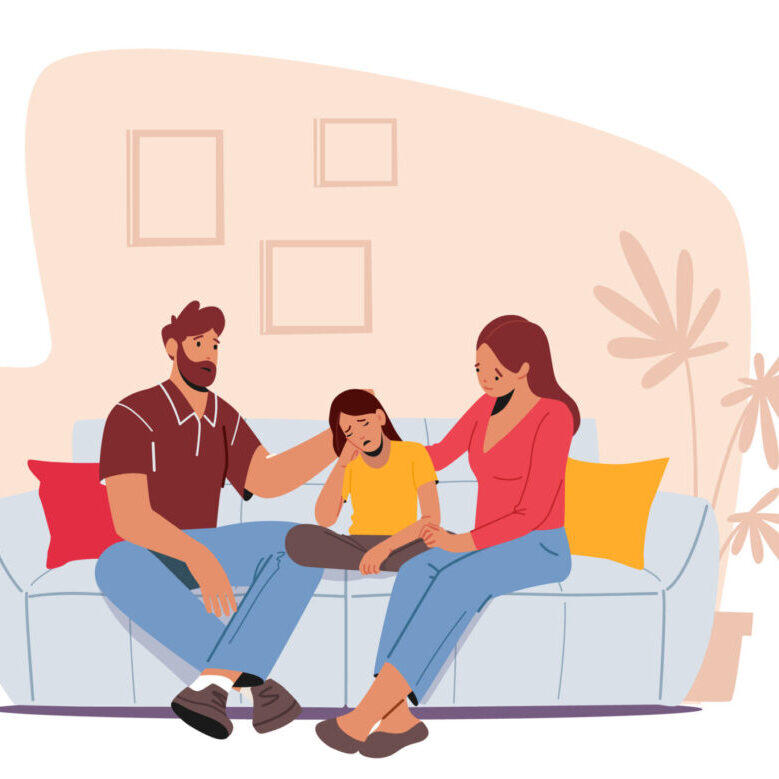Why Empathy is Essential in Building Strong LGBTQ+ Relationships

Empathy is the cornerstone of every healthy relationship, but it’s even more essential in LGBTQ+ relationships. Why? Because LGBTQ+ individuals often face unique societal challenges, such as discrimination, stigmatization, and exclusion.
These challenges require an extra layer of understanding and emotional support from their partners, a greater sense of “togetherness” and “being seen.” Empathy serves as a bridge, fostering deeper connections and helping partners navigate the complexities of queer love.
In Chicago, empathy is especially important in relationships as it helps bridge cultural, racial, and social differences that couples may encounter.
For queer and LGBTQ+ couples and relationships, empathy is crucial in navigating the unique challenges posed by living in a large urban environment, such as discrimination or societal pressures, while fostering emotional support and resilience. By cultivating empathy, partners can strengthen their connection and thrive amidst the complexities of Chicago city life.
The Role of Empathy in Relationships
Empathy is essential in all relationships, acting as the glue that holds two people together by allowing them to understand each other’s feelings, experiences, and perspectives. In LGBTQ+ relationships, empathy is not just about emotional support; it can be a lifeline to security.
What Is Empathy?
Empathy is the ability to understand and share the feelings of another. It’s about putting yourself in someone else’s shoes, seeing the world through their eyes, and feeling their emotions as if they were your own. When empathy is present, it fosters connection and strengthens relationships.
Why Empathy Matters More in LGBTQ+ Relationships
To truly cultivate empathy in LGBTQ+ relationships, it’s important to acknowledge the broader context of what many queer people experience. Queer and LGBT relationships often face external pressures that heterosexual couples may not experience as frequently.
Whether subtle or overt, discrimination is a harsh reality for many in the LGBTQ+ community. Partners in LGBTQ+ relationships may experience discrimination at work, in public spaces, or even from family members.
Microaggressions, minority stress, increased expectations of others, and battling mental health challenges linked to external pressures are, unfortunately, the norm for many queer people. In these relationships, empathy helps validate each other’s experiences, making partners feel seen and understood. This validation is crucial for building emotional resilience and trust.
Isolation and Mental Health for Queer and LGBT People
Many queer and LGBT people face isolation, whether from unsupportive family members or communities. This isolation can lead to anxiety, depression, or other mental health issues. When empathy is part of the relationship, partners can offer each other emotional support that builds connection and helps mitigate the effects of isolation from broader society.
Empathy Fosters Deeper Connections
One of the most important roles empathy plays in queer and LGBT relationships is its ability to deepen emotional intimacy. When empathy is present, partners feel more emotionally connected, which strengthens the overall foundation of their relationship.
Empathy also encourages vulnerability, which is crucial for building trust in any relationship. When partners feel safe to express their true selves without fear of judgment, trust deepens, and emotional connection thrives.
In queer and LGBT relationships, where societal judgment and exclusion can add emotional strain, it’s vital to create a safe space where both partners feel comfortable sharing their innermost thoughts and feelings.
Empathy plays a critical role in making that space emotionally safe. When one partner shows compassion and understanding, it reduces fear of judgment and invites vulnerability, strengthening trust.
But empathy goes even deeper—it impacts the brain, fostering neurological changes that strengthen bonds between individuals.
Empathy and the Brain
Empathy is not just an abstract emotional concept—it’s rooted in the brain. When we empathize with someone, regions of the brain associated with emotional processing, like the anterior insula and anterior cingulate cortex, are activated. These areas help us recognize and share the emotions of others.
Researchers Tristen Inagaki and Paula R. Pietromonaco (2022) found that empathy not only strengthens interpersonal connections but also fosters well-being through increased activation of these neural circuits. Their research found that couples with higher empathy scores reported stronger emotional bonds and lower stress levels, underscoring the role empathy plays in relationship satisfaction.
Ways to Cultivate Empathy in Your Relationship
Cultivating empathy in any relationship requires conscious effort and a commitment to understanding your partner’s experiences. Below are several practical strategies that can help foster empathy, strengthen emotional bonds, and create a supportive and loving partnership.
- Active Listening in LGBTQ Relationships – One of the most practical ways to cultivate empathy is through active listening. This is more than just hearing words; it’s about being fully present and attentive to your partner’s needs and feelings.
Active listening is the practice of listening to understand rather than to respond. This simple act cultivates empathy by showing your partner that their experiences and emotions matter. By engaging in active listening, partners create an environment of empathy and mutual respect, deepening the emotional connection between them. - Practice Mindful Communication – Mindful communication means speaking and listening with intent and care. It involves being fully present in conversations with your partner and offering them your undivided attention. This approach fosters empathy because it allows both partners to truly understand each other’s experiences, offering emotional support when it’s needed most.
- Develop Emotional Intelligence – Emotional intelligence (EQ) is the ability to be aware of, control, and express one’s emotions and handle interpersonal relationships judiciously and empathetically.
Developing emotional intelligence allows partners to understand and manage both their emotions and their partner’s feelings, which is key in LGBTQ+ relationships. Higher EQ leads to better emotional regulation and stronger interpersonal bonds. - Empathy as an Active Choice – Empathy is not just a feeling; it’s an active choice. Every day, queer and LGBT partners can choose to empathize with each other’s experiences. Whether through a kind word, a gesture of support, or simply being present, empathy is an active commitment that both partners need to make to maintain a healthy relationship.
- Building a Foundation of Compassion – Compassion is the bedrock of empathy. In queer and LGBT relationships, compassion should be present in every interaction. This means offering understanding even when you don’t fully “get” what your partner is going through. Over time, this creates a strong, loving foundation.
Empathy-Building Activity: The “Perspective Swap”
One powerful activity for building empathy in relationships is called the “Perspective Swap.” In this exercise, partners take turns sharing a difficult experience or feeling while the other listens without interruption. Afterward, the listener repeats back what they’ve heard but from the perspective of the person who shared.
This encourages both partners to step into each other’s shoes and reflect on how it feels to be on the other side of a situation. This exercise can deepen emotional understanding and is especially beneficial in LGBTQ relationships where external pressures may complicate communication.
Here’s how to try the “Perspective Swap”:
- Partner 1 shares a recent emotional challenge.
- Partner 2 listens quietly, without offering advice or judgment.
- Partner 2 then reflects back what they heard, but speaks as if they were Partner 1, describing the emotions and experiences from the first-person perspective.
- Switch roles and repeat.
Empathy is transformative in queer and LGBT relationships. It deepens emotional connections, fosters trust, and helps partners navigate the unique challenges they may face from societal pressures, discrimination, and internalized struggles. With empathy, LGBTQ+ relationships don’t just survive – they thrive.
We’re Here to Help!
If you and your partner(s) are looking to enhance empathy in your relationship, consider seeking therapy. At Tandem Psychology, we understand the importance of empathy in queer and LGBTQ+ relationships.
Through individual therapy, couples therapy, and relationship therapy sessions, we can help you and your partner strengthen your emotional connection and build a more empathetic, loving relationship.
Contact us today to schedule an appointment and begin your journey toward deeper understanding and connection.
This blog is made for informational and educational purposes only. It is not medical advice. The information in this blog is not intended to (1) replace a one-on-one relationship with a qualified licensed health care provider, (2) create or establish a provider-patient relationship, or (3) create a duty for us to follow up with you.



